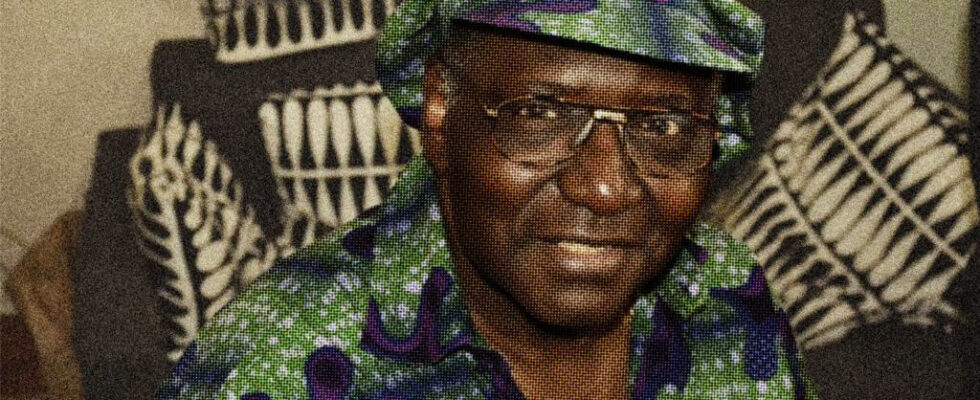Praised by his peers for his extraordinary musical qualities and paradoxically little known, if not ignored by the general public, the Congolese Rido Bayonne has developed a repertoire at the crossroads of jazz, funk and African music. Author of half a dozen albums, regular at Parisian clubs, the 77-year-old musician, singer and conductor, who died on November 16, was buried on November 22 in France where he had resided for a long time.
5 mins
When he claimed to have trained nearly 500 musicians during his career, Rido Bayonne was undoubtedly not exaggerating. Such a figure allows us to become fully aware of the role that the native of the Pointe-Noire area played and the place he occupied in the world of music in France and Africa with several generations of singers and instrumentalists.
Beyond the number stands out the multitude of talents that he helped to blossom, that he supported in the development of their artistic identity. A school, a family in which he is affectionately called “uncle”, one of those universities which know how to detect future brilliant people without necessarily trying to retain them, and whose reputation is built thanks to its network of alumni.
The violinist Clément Janinet is an example: arriving in the Rido Bayonne orchestra in 2002, he met the Cameroonian bassist Étienne Mbappé – a “former” – with whom he has been playing since 2007. And the tours in Africa have open to other music, as illustrated by his recent album Sokou! with the Malian Adama Dramé.
Member of the Amazons of Africa,the singer Fafa Ruffinoalso wishes to demonstrateher gratitude towards the one she describes as “maestro”. “When I arrived young from my native Benin for musicology school, I knew almost nothing. Despite this, you opened the doors to your big musical family for me.”she wrote on social networks.
The Congolese multi-instrumentalist who arrived in France in the early 1970s left his mark. “Rido, in his own right, was a real school and the best learned there. His conception of music forever changed mine. I know there are many of us in my situation”underlines Juan Rozoff, reference of the French funk scene, remembering among other things “brass riffs played by a pure section of ultra futuristic African funk”.
Heir to fusion music
Since the announcement of his disappearance, tributes have been pouring in: Cameroonians Richard Bona and Patrick Bebeythe West Indian Roger Raspail, the Senegalese Idrissa Diop… “When it came to writing and composing, he was an alien. He could do anything”explains the Beninese bassist Patrick Ruffinoanother eminent member of the variable geometry collective. And to evoke the difficulties of reading the pieces of Rido, “with sentences everywhere”to access his art of synthesis: “There is so much information in him that, in just one piece of music, you can feel classical, African music, jazz, funk. All the music of the world. »
For Clément Janinet, “Rido was a bit of an heir to fusion music, to an era attracted by technical prowess”both a descendant of Weather Report and an ascendant of Sixun (whose bassist Michel Alibo and drummer Paco Séry are among the Congolese’s first teammates). With another “coquette” : that there are as many musicians as possible on stage or in the studio! If they were regularly “between 14 and 18” on tour, list of album participants With hearts and souls in 2002 exceeded 150 names!
After having been in the service of the folk singer Graeme Allwright in the 70s, and having accompanied several French rock groups, Rido Bayonne took a step, in his eyes, decisive by joining forces with the harmonica player Sugar Blue, then in the James Brown group.
He sees it as the first association between an African and an American, materialized in 1982 with the album From Chicago To Paris on the blues terrain that both have in common in their cultures. The same year his first album was released. Eyano produced by Graeme Allwright. For the occasion, he invited Jean-Serge Essousa saxophonist from the capital’s Bantus who spotted his potential when he was barely ten years old.
From jazz clubs to studios
With the large orchestra that he put together at the same time, he performed in numerous festivals and at the same time became one of the main players in Parisian jazz clubs in the Châtelet-les Halles district, until the early hours of the morning, before continuing with studio sessions! In Bayonne, the city whose name he bears like his entire family since the Basques went to the Congo three centuries ago, he records in live Blackface in 1996.
The projects are multiplying, as are the tours in Africa: in Burkina Faso where he is involved in the creation of the Jazz Orchestra of Burkina; in his native Congo where he took part in the Pan-African Music Festival (Fespam) in 2005; in Cameroon, a country where he resided for a long time before coming to Europe and with which he evokes his links through the album Douala-Brazza (97 musicians!) in 2007.
His final album, Wedding ringspublished in 2018, was once again the result of a titanic work, bringing together more than twenty titles and dozens of musicians from various backgrounds, which he managed to get discussed. If his career has strangely passed under the media radar, Rido Bayonne nonetheless remains a reference that those who worked with him intend to maintain.
